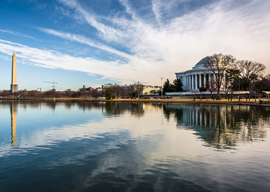
June 22, 2014

Source: Shutterstock
I”ve written before about how transitory a place the District can be. By its nature, the city is home to people jump-starting their career before moving on to better things. Many of the denizens come, work for a few years, and leave with memories of squeezing the system dryer for their own gain. It’s a place deserving of much scorn, but also recognition of how its workings create a ripple effect around the country. Sadly, the folks who live and work in the District rarely observe the roles they play in an evolving history. They don”t see the “place” of Washington, D.C. as anything of importance or worth preserving for its own sake.
I have no doubt that much of the hellacious government machinery in Washington should be ended immediately, with no incremental disintegration. Ninety-five percent of the federal workforce could disband without any real damage done to the country or economy. But as long as it’s here, it’s worth taking note of how small occurrences shape our understanding of life, the state, and civil society.
Religious conservatives often speak about “place” as a concept to understand so that we properly establish roots and flourish. Friends University Professor Russell Arben Fox says the virtue of place is only “ever realized through the discourse and history and trust” created by established community. The paradox of Washington is that communal connections aren”t necessarily formed through small-town bonding, but by a link to the significance of the city. Love it or hate it, the federal government is the great definer of history in America. The goings-on in the D.C. metropolitan area are how many people self-identify and establish friendships or business relations.
Thinking of place and significance in such a profound way demands pause. The great questions of why we are here on earth, and what our purpose truly is, are not readily answerable. But through introspection we can move one inch closer to the truth about reality; and the truth is, it’s astounding what can emerge from chance encounters. It’s daunting to think how much reverence we can imprint on the most ordinary places. Genesis 3:19 says we come from dust and will eventually return to dust. The empires we build, homes we construct, property we acquire, and materials we buy will all one day fade away. But we will retain the memory and continue to pass it on. And like Bob Woodward or the fictitious Rick Blaine, we might be lucky enough to play a larger part in threading the quilt of history.